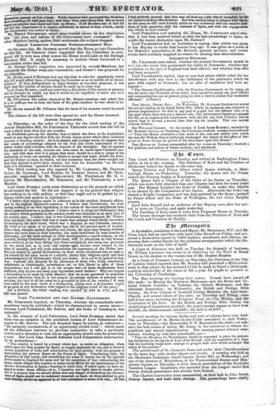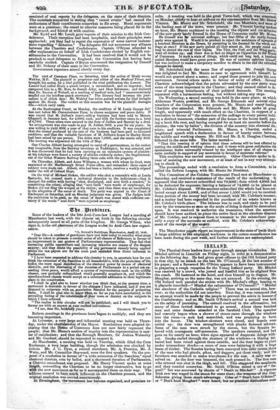Zbe IftEtropolis.
A deputation, consisting of the Lord Mayor, Mr. Masterman, M.P., and Mr. Jones Loyd, had an interview with Lord John Russell on Friday, and pre- sented a declaration signed by 7,000 bankers, merchants, and citizens, ex- pressing their cordial thanks for the judicious arrangements which the Go- vernment made on the 10th of April.
A Court of Aldermen was held on Tuesday, for despatch of business. Mr. William Lawrence was sworn in as Alderman for the Ward of Bread Street, on his election to the vacant seat of Mr. Hughes Hughes.
At a Court of Common Council, on Thursday, the Chairman of the City. of London School reported that Mr. Beaufoy had presented a third endow- ment to that school: he has invested 1,716/. in stock to found a third math- ematical scholarship of the value of 501. a year for pupils to proceed to the University of Cambridge.
The May meetings are running their course. Several have passed off this week: on Monday the Wesleyan Missionary, and the Home and Co- lonial Schools Societies; on Tuesday, the Church Missionary, and the Christian Instruction ' • on Wednesday, the British and Foreign Bible Society, the Free Church of Scotland Foreign Missions, the Anti-State- Church, and several others of less note; on Thursday and Friday, some half-dozen more, including the Religious Tract, the City Mission, and the Conversion of the Jews. At the British and Foreign Bible Society the Archbishop of Canterbury presided; the year's receipts appear to have been 90,1461., the disbursements 105,0431.; the debt is 41,800/. ; Several meetings for various shades and sorts of reforms have been held. The parishioners of St. Martin-in-the-Fields assembled in their Vestry- room on Thursday,—the Honourable E. P. Bouverie in the chair,—to' con- sider the best means of aiding Mr. Hume in his endeavour to nraluce ex- penditure and amend representation. The meeting passed abstract reso- lutions, winding up with this remarkable one- " That the Members for Westminster should be requested to place the preced- ing resolutions in the hands of Lord John Russell, with the expression of a hope that his Lordship would have courage to grapple with evils which endanger the safety of the country." The parishioners of St. Clement's Dane met under their Churchwardens on the same day, with similar objects and results. A meeting was held at the Mechanics Institution, Gould Square, Tower Rill, on Wednesday; and one of the electors of Marylebone, at the Westmoreland Rooms near Man- chester Square, on Thursday, to form branch associations of the Equitable Taxation League. Gentlemen who attended from the League stated that twenty distinct associations had already been formed.
The Chartist Convention have reassembled, at their hall in John Street, Fitzroy Square, and hold daily sittings. The proceedings have chiefly consisted of oral reports in the delegates, on the state of their districts. The members Concurred In stating that " recent events" had caused the enthusiasm of their constituents somewhat to die away. Moral arguments were at a premium; the resort to ulterior measures being placed far in the background, and hinted at with caution.
Mr. Kydd and Mr. Leech gave reports of their mission to the Irish Con- federates. Their reception had been hospitable, and their principles were
applauded; yet they had to regret the expression of some narrow insinua- tions regarding " dictation." The delegates did not announce any alliance between the Chartists and Confederates. Captain O'Bryan attended to offer explanations on behalf of Irish Confederates elected by Englieh con- stituencies to the Convention. It had been resolved that it would not be pruden't to send delegates to England; the Convention Act having been carefully studied. Captain O'Bryan announced the resignation by himself and Mr. Doheny of their seats in the Convention.
Government reporters attend closely every day. •
The ourt of Common Pleas, on Saturday, tried the action of Healy versus Wakley, M.P. The plaintiff is proprietor and editor of the Medical Times, and brought his action for a libel published in the rival publication the Lancet. The Lancet bad called Healy a quack lawyer, a mountebank, and an impostor; had compared him to a Mr. Ross, to Joseph Adey, and Ikey Solomon; and declared that Dr. Burton of Walsall, at a meeting of medical men, had " unceremoniously snuffed out the brieffrat quack secretary." The literary fend between the jour- nalists is of oldish date: Mr. Wakley has twice gamed actions for libel brought against Mr. Healy. The verdict on this occasion was for the plaintiff: damages 40s.—which carry costs.
At the Bankroptey Court, on Monday, the creditors of M. Louis George Jul- lien met before Mr. Commissioner Fans, to choose assignees and prove debts. It was stated that AL Jullien's music-selling business had been sold to Messrs. Chappell, in January last, for 4,0001. cash, and bills for further sums to a total of 6,7001. These sums were secured to the firm of Jullien and Barrett by a deed.
An arrangement was also made to pay M. Jullien 9001. a year for six years: he - was willing to yield 8001. a year of that sum to his creditors. It was complained that the money produced by the sale of the business bad been paid to favoured creditors; and that the valuable furniture of M. Jullien's house in Harley Street bad been seized by one person. The debts were 7,0001., and the assets only 3001. The meeting was adjourned till the 15th of May.
One Charles Abbott having attempted to carry off a portmanteau, in the coolest
way imaginable, from the Railway terminus at Paddington, he was arrested, and it was discovered that he had been carrying on an extensive system of plunder: at his lodgings were found a variety of articles evidently stolen; the Superintend- ent of the Great Western Railway lading three cabs with the property.
On Thursday, Abbott, and Anne Williams, a woman with whom be lived, were examined at the Marlborough Street Police-office, and remanded: three cases of robbery were made out. Abbott, who had been a butler, receives a weekly stipend under the will of Colonel Hope.
On the trial of Michael Stokes, the soldier who shot a comrade's wife at Leeds
Barracks, his counsel made a technical objection to the indictment—that it charged the soldier with having "shot, discharged, and sent forth a musket," in committing the crime; alleging that " sent forth " were words of surplusage, for Stokes did not fling the weapon at his victim; and thus there was an uncertainty in the allegation of the cause of death. The point was argued in the Court of • Exchequer on Saturday, and on Monday judgment was given. The Judges held the conviction to be goad,, as the cause of death was stated with sufficient cer- tainty if the words" sent forth " were rejected as surplusage.



























 Previous page
Previous page